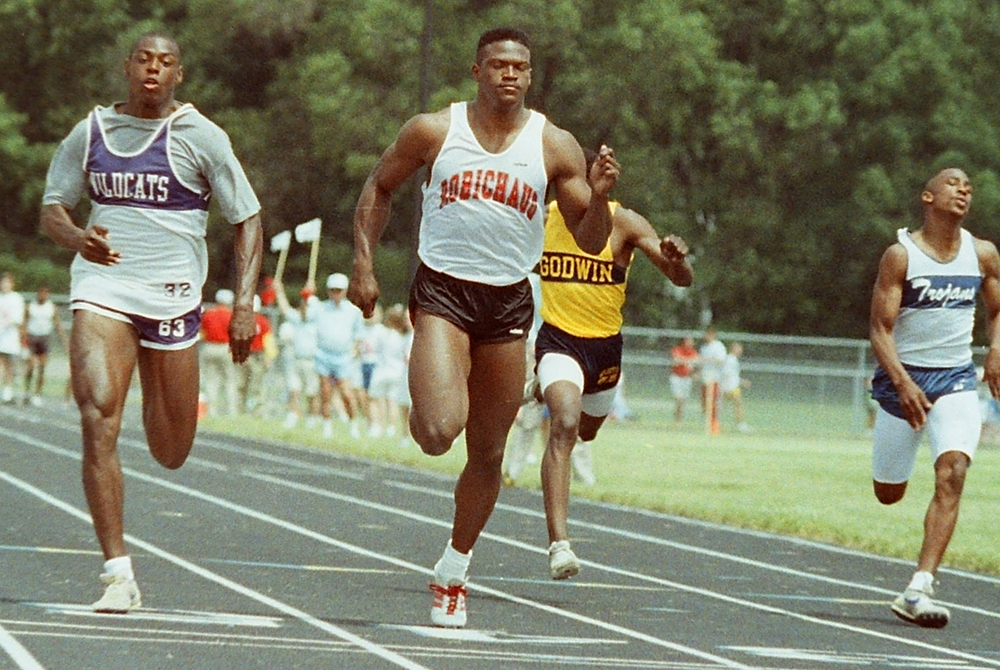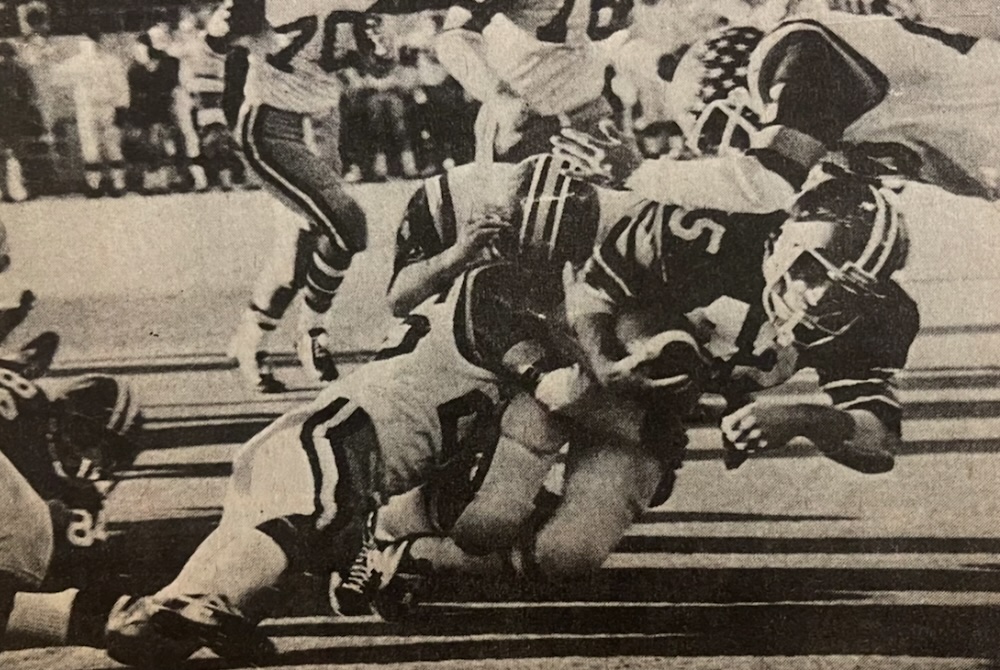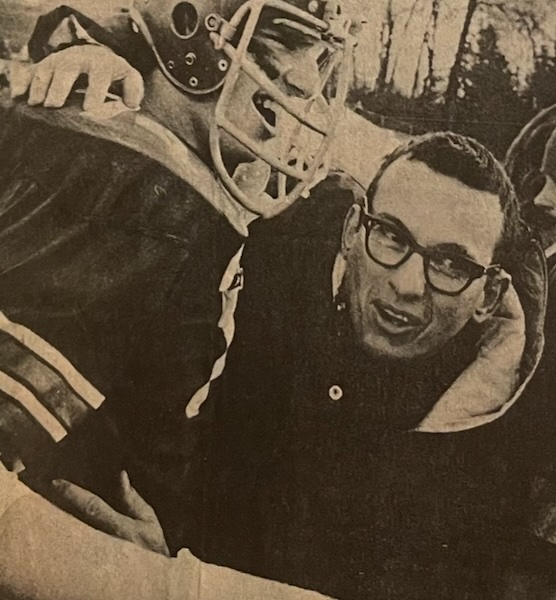
Robichaud 3-Sport Legend Wheatley Selected to National High School Hall of Fame
By
Geoff Kimmerly
MHSAA.com senior editor
March 11, 2024
The playing career of 1991 Dearborn Heights Robichaud graduate Tyrone Wheatley remains one of the most storied in Michigan high school sports history. His prestige gained during that early stage of his athletic stardom has been recognized nationally as well, as Wheatley was one of 12 honorees announced today as this year’s inductees into the National High School Hall of Fame by the National Federation of State High School Associations (NFHS).
Wheatley – who grew up in Inkster and is currently the head football coach at Wayne State University – will be inducted as one of 11 honorees selected for the 41st Hall of Fame class at a ceremony during the NFHS summer meeting July 1 in Boston. The rest of the class is made up of three more athletes, four coaches, two former state association administrators and a game official. Wheatley was nominated by the Michigan High School Athletic Association.
Wheatley will become the Hall of Fame’s 10th inductee from Michigan, joining the MHSAA’s first full-time Executive Director Charles E. Forsythe (inducted 1983), River Rouge boys basketball coach Lofton Greene (1986), Warren Regina athletic director, softball and basketball coach Diane Laffey (2000), Fennville basketball and baseball standout Richie Jordan (2001), Grosse Pointe Woods University Liggett boys and girls tennis coach Bob Wood (2005), Bloomfield Hills Cranbrook hockey standout Jim Johnson (2007), Owosso football, basketball and baseball all-stater Brad Van Pelt (2011); Vermontville Maple Valley baseball national record holder Ken Beardslee (2016) and retired MHSAA Executive Director John E. “Jack” Roberts (2022).
To the greater public, Wheatley surely is best known as a star running back for University of Michigan who went on to play 10 seasons in the NFL for the New York Giants and Oakland Raiders. However, he is arguably most glorified in Michigan high school athletics for his accomplishments on the track, where as a junior in 1990 he became the first (of still only two) athletes to win four individual events at an MHSAA Lower Peninsula Finals – placing first in the 100 and 200-meter dashes, 110-meter hurdles and long jump. He led Robichaud to the Class B team title that day, scoring 40 of its 49 points. Wheatley completed his high school career in 1991 with three more Class B individual track & field championships and nine total over his final three seasons; he was injured in the 100 during that senior-year meet and could not run his final race to attempt another four-title day.
Wheatley’s meet records of 13.7 seconds in the 100 at the 1991 LP Class B Final and 23-10¾ in long jump in 1989 still stood when the four-Class track & field format was retired after the 1999 season. He also remains the only athlete to win the 100 three times at the prestigious Mehock Relays in Mansfield, Ohio, also finishing first in the 110 hurdles and 200 and runner-up in the long jump at that meet in 1991.
Wheatley was similarly accomplished on the high school football field, leading his team to a state championship in 1990 and earning a Parade All-America honor. Over three varsity seasons total he ran for a combined 4,257 yards and 67 touchdowns, including 2,010 yards and 33 scores on 208 carries as a senior in 1990 – the latter despite playing quarterback half of that season (and throwing five touchdown passes). He played quarterback, running back, defensive back, punter, kicker and returned kicks, and he scored 252 points over 13 games as a senior and 484 over 38 career games.
Wheatley also was a standout on the basketball court for Robichaud, averaging 14 points and 16 rebounds per game as a senior in earning all-state recognition in that sport as well.
“My city where I come from, Inkster, means the world to me. I grew up in an incredible era of sports in Michigan (with successful University of Michigan and Detroit pro teams) … but if you ask me who my idols were, they were the guys I grew up with playing on the playground,” Wheatley said. “After you come from a basketball game where you see Jarvis Walker drop 30, or Earl Jones running the last 200 of a race backwards … you hear people talk about them, you hear their reverence about them, and I just wanted to be put in the conversation of the best to come out of Inkster, forget the state. I can tell you this for sure: I’m not the best athlete to come out of Inkster, just the person who got the recognition. And my foundation was built watching, taking notes, preparing, working out and just trying to be one of the guys.
“(Robichaud was) the step. Because without Robichaud … Michigan, the NFL, me coming back to coach, it doesn’t happen,” Wheatley said. “Without the Robert Yaucks (his football coach at Robichaud), the Coach (Leit) Jones (his Robichaud track coach), the Coach (Mercer) Brysons, the (coach) Wade Cooks, the (coach Jeff) Flounorys, the Millie Hursins (his academic advisor) of the world, this doesn’t happen. Without my high school teammates, none of this happens. So it’s not just a step. What’s the saying – the first impression is the lasting and best impression? Robichaud was it.”
Wheatley returned to Robichaud as its varsity football coach in 2007 and led that team to a 9-2 record and the MHSAA Playoffs for the first time since 1994 – after Robichaud had finished 0-9 the previous season. He has served as an assistant football coach at four college programs including U-M and Syracuse, and with the Buffalo Bills, Jacksonville Jaguars and Denver Broncos.
He also served as Morgan State University's head coach from 2019-21 and just completed his first season as head coach at Wayne State, which finished 3-8 – an improvement of two wins from 2022 and the program’s best record since 2019.
Wheatley graduated from University of Michigan in 2008 with a bachelor’s degree in kinesiology. He and wife Kimberly have five children: Tyrone Jr., Terius, Tyrique, Tiana and Tamari. Tyrone Jr., an offensive tackle, played this past season for the New England Patriots.
“Many of us who grew up in Michigan grew up as fans of Tyrone Wheatley because of what he accomplished at the college level – but his legendary story begins at Dearborn Heights Robichaud, where his outsized athletic ability was on full display in every sport he played,” MHSAA Executive Director Mark Uyl said. “Michigan has produced several professional athletes in a variety of sports and nearly 50 Olympians in track & field alone, and what Tyrone Wheatley achieved as a high school athlete remains a standard few have approached. We are ecstatic that he will deservedly take his place among the all-time elite high school athletes nationally as well.”
The National High School Hall of Fame was started in 1982 by the NFHS. The 11 individuals were chosen after a two-level selection process involving a screening committee composed of active high school state association administrators, coaches and officials, and a final selection committee composed of coaches, former athletes, state association officials, media representatives and educational leaders. Nominations were made through NFHS member associations. Also chosen for this class were athletes Joe Mauer (Minnesota), Takeo Spikes (Georgia) and Dot Ford Burrow (Mississippi); sport coaches Paula Kirkland (South Carolina), Gary Rankin (Tennessee), Roy Snyder (Pennsylvania) and Ronald Vincent (North Carolina); former state association administrators Mike Colbrese (Washington) and Marie Ishida (California), and baseball/football game official David Core (Oklahoma).
For more on this year’s Hall of Fame class, visit the NFHS Website.
PHOTO Tyrone Wheatley crosses the finish line first during one of his nine MHSAA Finals track & field championship victories. (MHSAA file photo.)

Memories Don't Fade for 1st MHSAA Class A Champion Franklin
By
Brad Emons
Special for MHSAA.com
November 8, 2024
Even after 50 years, Tim Hollandsworth recalls Livonia Franklin’s run to the first MHSAA Class A football playoff championship like it was yesterday.
Before 5,506 fans at Western Michigan University’s Waldo Stadium, the unranked Patriots capped a season for the ages by upending heavily favored Traverse City for the 1975 title, 21-7.
“It was a once in a lifetime event, and I guess it just brings back great feelings winning that game obviously,” said Hollandsworth, who went on to become an all-Mid-American Conference linebacker at Central Michigan. “What I remember most was carrying that trophy around on the field. Myself, Jim Casey and the whole team ... we paraded it out Stanley Cup-style in front of our fans, and everybody was going crazy. Just a happy time.”
The championship game was played on a frigid Nov. 22 afternoon in Kalamazoo, just 12 years following the assassination of President John F. Kennedy.
“When I think about that game, the first thing that comes to mind is that it was a cold, cloudy day before the game,” Hollandsworth said. “And as the game started, the sun came out; it was really bright. It turned out to be a bright, sunny day, and we didn’t feel the cold at all. The adrenalin was pumping.”
No. 2-ranked Traverse City, coached by Jim Ooley, entered with a high-powered offense averaging 34 points per game. The Trojans featured the running back tandem of Rick Waters (1,300 yards) and Bruce McLachlan, along with tight end Mark Brammer, a two-time All-American at Michigan State who later played five seasons for the Buffalo Bills in the NFL.
Franklin took a 7-0 lead in the first quarter when Dennis Smith, the holder on a 30-yard field goal attempt by Sam Williams, couldn’t secure the snap from center but alertly got up and tossed a 17-yard TD pass to Rick Lee.
The Patriots then went up 14-0 in the second quarter on a 3-yard TD run by Casey, who went on to play four seasons at Ball State as a defensive back.
Traverse City cut the deficit to 14-7 before halftime on a 2-yard TD run by McLachlan, but the Patriots put it away in the final quarter on a 9-yard TD run by Casey, who finished the game with a hard-earned 105 yards on 24 carries.
Hollandsworth, who also starred in the backfield with Casey, severely twisted his ankle in the first half and was limited to playing only defense for the remainder of the game. Fortunately for Franklin, Tom Smith took his place and helped continue the offensive surge.
 “It was just the fact that everybody was just stepping up when they had to have them,” Casey said. “I think it kind of exemplified everything we did throughout the year to get there. That’s what was so cool about the whole deal.”
“It was just the fact that everybody was just stepping up when they had to have them,” Casey said. “I think it kind of exemplified everything we did throughout the year to get there. That’s what was so cool about the whole deal.”
Meanwhile, Waters – who later became Hollandsworth’s friend and teammate at CMU – led the Trojans’ rushing attack with 85 yards rushing on 19 carries.
Franklin’s defense played a pivotal role in the win with four interceptions – one each by Hollandsworth, Chuck Hench, Jerry Pollard and Casey (his 10th of the season).
Williams, the Patriots’ star tight end and middle linebacker and the son of former Detroit Lions “Fearsome Foursome” defensive end Sam Williams Sr., also batted down a key fourth-down pass in the end zone to thwart a Traverse City scoring threat.
“It’s funny about the whole game ... you forget about the details, it’s crazy,” Casey said. “It was everybody coming together. There may have been some mistakes along the way. That just happens during the game and we hung in there, did what it took to score enough points to win.”
The game was played on artificial turf, not real grass, which was also a first for both teams.
“I think it had been raining the day before ... anyhow, the field was soaked,” Casey said. “And all it takes is to fall on a field that is soaked on an Astroturf field and everything, and all your clothes are soaked. I remember in the first half – I couldn’t wait for halftime to go inside and warm up.”
During the practice week prior to the title game, the Patriots were able to get acclimated when athletic director and assistant coach George Lovich made a deal to practice on the University of Michigan’s artificial surface.
“We had to get new shoes because nobody had played on artificial turf in high school back then,” Casey said. “They had a bunch of used shoes from the (U-M) team. They threw them in a big old box and they let us practice one night on their Astroturf. We went in and got our shoes and we were ready to play – excited about that. It was just different compared to regular grass. It felt super-fast.”
With only four spots per Class up for grabs in the inaugural MHSAA playoffs, five unbeaten Class A teams did not make the postseason including Warren Fitzgerald and Mount Clemens Chippewa Valley from Region 1, Trenton in Region 3, and Grand Rapids Union and Marquette from Region 4.
On the final Saturday of the regular season at Eastern Michigan’s Rynearson Stadium, No. 1-ranked Birmingham Brother Rice (Region 2) was upset in the Catholic League championship, 7-0, by Dearborn Divine Child, which went on to claim the Class B title.
That allowed the 8-1 Patriots, who had lost to rival Livonia Stevenson 13-9 in Week 2, to sneak into the playoffs just ahead of the previously-unbeaten Warriors.
“We were all in the stands watching that game,” Hollandsworth said. “And our coach, Armand Vigna, had all our points figured out right to the point where he said if Brother Rice were to lose, we were in. So, we’re sitting in the stands and Detroit Southwestern is off to our right a little bit higher in the stands. When Divine Child won that game, we were just going crazy and you could see Southwestern wondering who we were and what was going on.”
During the build-up to the Class A Semifinal game against Franklin, Southwestern coach Joe Hoskins was quoted in the Detroit newspapers as saying, “Livonia who?”
Southwestern was led by all-state QB Mike Marshall (MSU), along with junior tackle Luis Sharpe (UCLA), an eventual first-round NFL pick who played 13 seasons with the St. Louis, Phoenix and Arizona Cardinals.
And in that Semifinal at Pontiac’s Wisner Stadium before 5,000 fans, Franklin upended the No. 3-ranked Prospectors, 12-9, as Casey ran for 145 yards on 27 carries. Hollandsworth added a 1-yard TD to cap a nine-play, 72-yard drive and give his team the lead 9-7 at the half.
Southwestern got an 18-yard TD pass from Marshall to Andrew Williams and scored on a two-point safety when the Patriots fumbled the kickoff to start the second half.
Williams, however, booted a pair of field goals, including the game-winning 28-yarder to break a 9-9 deadlock for the Patriots after they were aided by a pass interference call followed by an unsportsmanlike conduct penalty, which took the ball to the Southwestern 18.
In protest, Hoskins took his team off the field and had to be coaxed by MHSAA officials to bring his players back to finish the game.
“I think we were excited about the playoffs because we were undefeated the year before, so were looking forward to getting into the playoffs,” Hollandsworth said. “It was deflating when we lost; it was low-scoring, tough battle versus Stevenson. All the Livonia games (vs. Churchill and Bentley) were tough battles. It was the first game that Sam Williams was out. He got hurt in the (Dearborn) Fordson game before that (the opener) and Sam was not only our tight end, and starting middle linebacker, but he was also our punter and kicker. I think we passed up some field goals in that Stevenson game because we were so unsure of our kicking game.”
PHOTOS (Top) Livonia Franklin’s Jim Casey (45) plows ahead during the 1975 Class A Final as Traverse City tacklers converge. (Middle) Franklin coach Armand Vigna, right, shares an embrace with lineman Rick Kruger in the moments after their team’s championship victory. (Photos courtesy of Hometown Life, which includes the former Livonia Observer).

